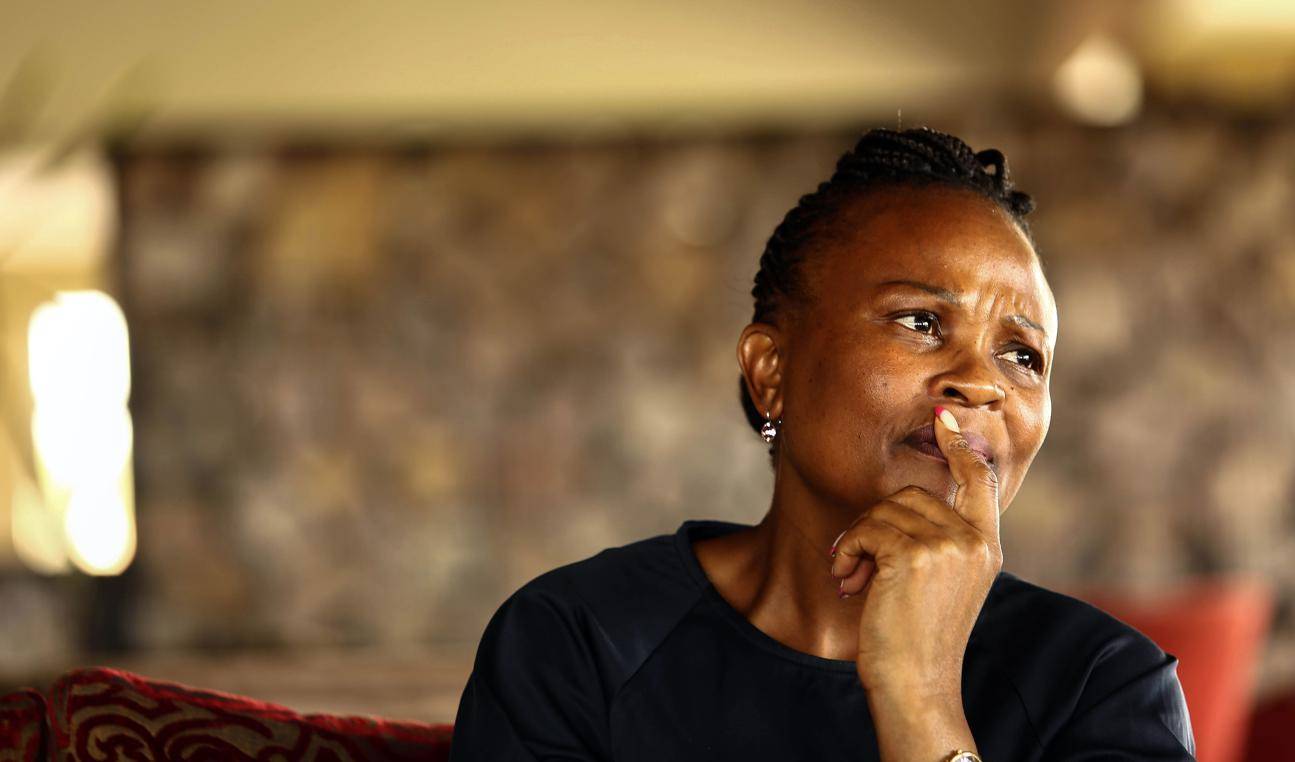
EFF, Public Protector lose ConCourt bid to appeal interdict against Gordhan remedial action
by Azarrah Karrim- The Constitutional Court has unanimously dismissed the Public Protector's bid to institute remedial action on Public Enterprises Minister Pravin Gordhan.
- The court found that Gordhan met the requirements for an interdict and Gordhan has since welcomed the judgment
- Public Protector Busisiwe Mkhwebane's personal costs order was set aside.
Public Enterprises Minister Pravin Gordhan has welcomed a unanimous Constitutional Court judgment which dismissed a leave to appeal application lodged by the EFF and the Public Protector in the so-called SARS "rogue unit" matter.
In a statement issued hours after the judgment, Gordhan's legal team from Malaji and Co Attorneys said the judgment reaffirmed the rights of people, including Gordhan, to seek interim relief.
"The Constitutional Court judgment reaffirms the rights of persons to obtain interim relief, even against the Public Protector, in circumstances where the test as set out in prior Constitutional Court judgments has been met.
"This was the case with Minister Gordhan who obtained an interim interdict in order to protect his right not to be subjected to, amongst others, undefined disciplinary action by the president of the Republic of South Africa, pending a judicial review of the findings and remedial actions of the Public Protector," it said.
Last year, the EFF and Mkhwebane approached the apex court seeking leave to appeal an order of the Gauteng High Court in Pretoria, which interdicted the Public Protector's remedial action against Gordhan while he took the report on review.
They failed on Friday but the court granted them leave to appeal the High Court's costs order against the EFF and Mkhwebane in her personal capacity.
READ| Mkhwebane welcomes release of rogue unit report to her by state security minister
The court also decided that no special test was needed for the granting of interim interdicts against the Public Protector, as the so-called OUTA test already provides that these tests must only be used in exceptional circumstances.
High Court
The matter dates back to last year when Gordhan launched an urgent application in the High Court for an order to temporarily suspend the remedial action of the Public Protector in her report on allegations of maladministration at SARS by Gordhan, Pillay, Magashula and others.
The High Court found that Gordhan met the requirements for an interdict.
These requirements were set out in a case involving OUTA (The Organisation Undoing Tax Abuse) – now known as the OUTA test.
The High Court awarded costs against the Public Protector, the EFF, as well as Mkhwebane in her personal capacity.
Arguments in the ConCourt
Both parties filed urgent applications for leave to appeal the High Court judgment and orders in the Constitutional Court.
The EFF argued that the judgment interfered with the Office of the Public Protector and that the OUTA test was inappropriate for an interim order against Chapter 9 institutions. They said a new, stricter test had to be developed.
The Public Protector's counsel argued that the High Court applied incorrect legal standards when it granted the interdict, saying they disregarded the effect it would have on her powers and functions.
They also appealed the personal costs order against her.
The OUTA test
In deciding the matter, the Constitutional Court's main concern was the test that should be applied when granting interim interdicts against the Pubic Protector.
It held that the EFF's argument for a stricter test was without merit and the OUTA test was already only used in exceptional circumstances.
It said the test was flexible enough to protect the powers and functions of the Public Protector and found there was no compelling reason to create a new, special test in this regard.
The Constitutional Court also agreed with the High Court that the interdict granted to suspend the Public Protector's remedial action would not interfere with the Public Protector's duties because once her report is published, she has already completed her duties.
READ | 'You're free to go' - Relief for ex-SARS officials as charges withdrawn in lengthy rogue unit saga
It also found that exceptional circumstances did not exist in the application, and it did not satisfy the interests of justice regarding the appealability of interim orders.
Leave to appeal in both applications were dismissed.
Costs order
However, leave to appeal was granted against the costs order of the High Court after the court found that the High Court did not apply the applicable legal principles properly.
The costs order against the EFF and the personal costs order against Mkhwebane were both set aside.
The apex court said there was no justification for a personal costs order against Mkhwebane.
"In fact, the High Court disavowed any reliance on the adverse allegations made by Mr Gordhan, which could have possibly grounded a personal costs order," the judgment read.
Instead, it replaced the costs order against the EFF with one ordering the Public Protector to pay the costs of Gordhan, Pillay and Magashula.
The Constitutional Court also noted the public interest in the matter as well as criticism of the courts and of the Public Protector, which it encouraged.
However, it warned of the dangers of unreasonable and unsupported criticism against both which, it said, could undermine constitutional democracy.